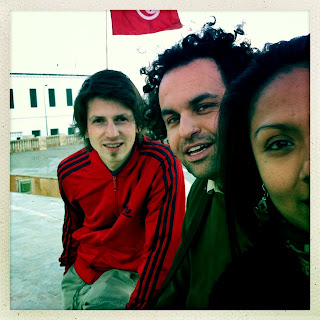The Good Cuisine
At the first glance, it seemed to be just reading about cooking, chefs and restaurants in Germany. Then I discovered that it was more than that.

I found this article in the German newspaper Süddeutsche Zeitung, about Vincent Klink, one of the best chefs in Germany. Author of cooking books, Jazz musician, who also plays the flute. He is the main figure of two TV-shows: ARD-Buffet and Vincent Klinks Kochkunst in the SWR-Studios of Baden-Baden. But he is doing not just money with his profession. He has a compromise, a higher objective. Honorary chairman of “Slow Food” Germany, is leading of a campaign against food multinationals. Concerned about food culture of nowadays. Owner and “art director“ of the restaurant Wielandshöhe in Degerloch, near to Stuttgart, has been awarded with the star “Michelin Stern” by the Michelin Guide.
In the conversation between Evelyn Roll and Vincent Klink, appeared an interesting phrase:
“Um den wahren Wert eines Menschen zu ermittlen –bzw. das ganze Ausmass seiner Nichtsnutzigkeit -, genügt es völlig, gemeinsam mit ihm zu kochen” (Vincent Klink, Stuttgart, 2007).
“To appraise the value of a person – and the dimension of his worthlessness-, it is absolutely sufficient to cook together.”
About TV and Food culture in Germany
- There are more that ninety cooking TV programs, whose audience are 400 000 spectators.
- 52% of the audience of cooking TV programs, says that they have learnt some tips and tricks from the professional cooks. But: not necessarily the 52% cooks.
- 74% of the audience says that they cook at home every, or fast everyday. The matter is how they cook when they do so.
- At the end, maximum 5% of the audience really cooks a dish seen on TV.
Evelyn Roll imagines: “Looking at food, instead of cooking food. It is like watching Porno and having no sex.”
Luxurious gastronomy: Designing meaningful information
Evelyn Roll wrote about Vincent Klink and his saddle of hare menu:
“When there is saddle of hare, but people simply don’t choose it, then the next day, he writes in the menu: “Hunter Egon’s saddle of hare”. When it is written like that in the menu, “of Hunter Egon”, then people like to eat saddle of hare. Luxurious gastronomy makes like that.”
Then I remember a name:
Dionisio “Baco” Rangel
A 51-year-old man living in the United States, Mexican chef with a strong sense of heredity and virtuosity. Dionisio "Baco" Rangel has been invited to write for national and international dailies, to have lectures and offer courses, to be on TV, and, of course, to publish cooking books. In a country like the United States of America, he decided to preach the “Good cuisine”, even when he considers that Americans are incapable of understanding or practicing it. It is a hard but sincere critic to his neighbor country. He thinks that it is not about being against the U.S., but dreaming about a conquest, a culinary one.
“Saber de gastronomía puede ser fuente no sólo de fortuna, sino de magníficos banquetes, convirtiendo la necesidad de la supervivencia en el lujo de la vivencia” (Carlos Fuentes, 1995).
“Knowing about gastronomy could be source not only of money, but of magnificent banquets, changing the need of survival into the luxury of the experience”.
Food research
After a research in physical and mental hospitals, universities and jails, Dionisio “Baco” Rangel discovered that the same kind of menu would be found everywhere:
“Lechuga desmayada, coronada con jalea de fresa. Seguía el consabido pollo de hule, incortable e inmasticable, servido con ejotes duros y un puré de papas enamorado del sabor de donde salió. El postre era una simulación del strawberry shortcake, pero en version esponja de baño. Por último, un café aguado permitía ver hasta el fondo de la taza y admirar los círculos geológicos que diez mil porciones de veneno había dejado en ella.” (Carlos Fuentes, 1995).
“Ensalada con jalea de fresa, cauchesco pollo, esponjoso pastel y translúcido café”. (Carlos Fuentes, 1995).
“Conclusion, wrote Fuentes: Institutional food, generalized, whose exceptions would be, if not memorable, may be surprising… “
Carlos Fuentes created this character in 1995. Dionisio “Baco” Rangel is the protagonist of “El Despojo”, The Stripping, one of nine stories that conform the novel “La Frontera de Cristal”, The Crystal Frontier. In it, Fuentes tells about the hard intercultural exchange between Mexico and the United States suffered and borne by migrants. Dionisio “Baco” Rangel is encouraged by his love for cuisine, to do something for healing the problem: to show to the Americans - with the hope of making them learn-, how to cook, how to eat, how to really live. A no-easy task to do.
Vincent Klink and Dionisio "Baco" Rangel, novel characters or real persons… they have something in common: a passion for the Good cuisine.
References:
Fuentes, Carlos. La Frontera de Cristal. Punto de Lectura, Mexico, 2004.
Roll, Evelyn. “Wo der Hase im Pfeffer liegen darf”. Die Seite Drei. Süddeutsche Zeitung. Nr. 295. 22,23 Dec. 2007. 03.

I found this article in the German newspaper Süddeutsche Zeitung, about Vincent Klink, one of the best chefs in Germany. Author of cooking books, Jazz musician, who also plays the flute. He is the main figure of two TV-shows: ARD-Buffet and Vincent Klinks Kochkunst in the SWR-Studios of Baden-Baden. But he is doing not just money with his profession. He has a compromise, a higher objective. Honorary chairman of “Slow Food” Germany, is leading of a campaign against food multinationals. Concerned about food culture of nowadays. Owner and “art director“ of the restaurant Wielandshöhe in Degerloch, near to Stuttgart, has been awarded with the star “Michelin Stern” by the Michelin Guide.
In the conversation between Evelyn Roll and Vincent Klink, appeared an interesting phrase:
“Um den wahren Wert eines Menschen zu ermittlen –bzw. das ganze Ausmass seiner Nichtsnutzigkeit -, genügt es völlig, gemeinsam mit ihm zu kochen” (Vincent Klink, Stuttgart, 2007).
“To appraise the value of a person – and the dimension of his worthlessness-, it is absolutely sufficient to cook together.”
About TV and Food culture in Germany
- There are more that ninety cooking TV programs, whose audience are 400 000 spectators.
- 52% of the audience of cooking TV programs, says that they have learnt some tips and tricks from the professional cooks. But: not necessarily the 52% cooks.
- 74% of the audience says that they cook at home every, or fast everyday. The matter is how they cook when they do so.
- At the end, maximum 5% of the audience really cooks a dish seen on TV.
Evelyn Roll imagines: “Looking at food, instead of cooking food. It is like watching Porno and having no sex.”
Luxurious gastronomy: Designing meaningful information
Evelyn Roll wrote about Vincent Klink and his saddle of hare menu:
“When there is saddle of hare, but people simply don’t choose it, then the next day, he writes in the menu: “Hunter Egon’s saddle of hare”. When it is written like that in the menu, “of Hunter Egon”, then people like to eat saddle of hare. Luxurious gastronomy makes like that.”
Then I remember a name:
Dionisio “Baco” Rangel
A 51-year-old man living in the United States, Mexican chef with a strong sense of heredity and virtuosity. Dionisio "Baco" Rangel has been invited to write for national and international dailies, to have lectures and offer courses, to be on TV, and, of course, to publish cooking books. In a country like the United States of America, he decided to preach the “Good cuisine”, even when he considers that Americans are incapable of understanding or practicing it. It is a hard but sincere critic to his neighbor country. He thinks that it is not about being against the U.S., but dreaming about a conquest, a culinary one.
“Saber de gastronomía puede ser fuente no sólo de fortuna, sino de magníficos banquetes, convirtiendo la necesidad de la supervivencia en el lujo de la vivencia” (Carlos Fuentes, 1995).
“Knowing about gastronomy could be source not only of money, but of magnificent banquets, changing the need of survival into the luxury of the experience”.
Food research
After a research in physical and mental hospitals, universities and jails, Dionisio “Baco” Rangel discovered that the same kind of menu would be found everywhere:
“Lechuga desmayada, coronada con jalea de fresa. Seguía el consabido pollo de hule, incortable e inmasticable, servido con ejotes duros y un puré de papas enamorado del sabor de donde salió. El postre era una simulación del strawberry shortcake, pero en version esponja de baño. Por último, un café aguado permitía ver hasta el fondo de la taza y admirar los círculos geológicos que diez mil porciones de veneno había dejado en ella.” (Carlos Fuentes, 1995).
“Ensalada con jalea de fresa, cauchesco pollo, esponjoso pastel y translúcido café”. (Carlos Fuentes, 1995).
“Conclusion, wrote Fuentes: Institutional food, generalized, whose exceptions would be, if not memorable, may be surprising… “
Carlos Fuentes created this character in 1995. Dionisio “Baco” Rangel is the protagonist of “El Despojo”, The Stripping, one of nine stories that conform the novel “La Frontera de Cristal”, The Crystal Frontier. In it, Fuentes tells about the hard intercultural exchange between Mexico and the United States suffered and borne by migrants. Dionisio “Baco” Rangel is encouraged by his love for cuisine, to do something for healing the problem: to show to the Americans - with the hope of making them learn-, how to cook, how to eat, how to really live. A no-easy task to do.
Vincent Klink and Dionisio "Baco" Rangel, novel characters or real persons… they have something in common: a passion for the Good cuisine.
References:
Fuentes, Carlos. La Frontera de Cristal. Punto de Lectura, Mexico, 2004.
Roll, Evelyn. “Wo der Hase im Pfeffer liegen darf”. Die Seite Drei. Süddeutsche Zeitung. Nr. 295. 22,23 Dec. 2007. 03.


Comments